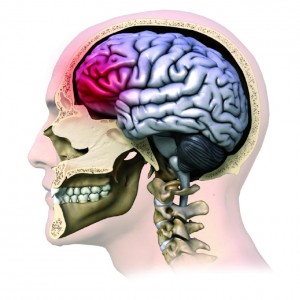 It seems that one cannot read today’s newspapers without finding some reference to concussion. Concussion is a hot topic not only in professional sports but at the college, high school and youth levels. Concussion describes a mild traumatic brain injury (TBI) due to movement of the brain inside the skull. Injured brain cells experience an “energy crisis” and are unable to function properly.
It seems that one cannot read today’s newspapers without finding some reference to concussion. Concussion is a hot topic not only in professional sports but at the college, high school and youth levels. Concussion describes a mild traumatic brain injury (TBI) due to movement of the brain inside the skull. Injured brain cells experience an “energy crisis” and are unable to function properly.
Concussion is defined as causing at least one of the following: loss of consciousness, alteration of mental status, post-traumatic amnesia and abnormal neurological findings. Current recommendations are to remove the concussed athlete immediately from competition for an evaluation. A plan for a gradual return to play should only be considered when the athlete is symptom-free, typically days later. If an athlete returns to play before full recovery and then sustains another concussion, this second concussion often leads to more severe symptoms and is associated with a slower recovery. One lingering conundrum: brain functioning may not have fully normalized even after symptoms have resolved; the availability of more sophisticated technology may eventually help clinicians advise athletes when they are truly ready to return to competition.
As an adult neurologist, I frequently see patients that endured a concussion after a fall, motor vehicle accident or after an object strikes the head. While many adults recover fully from a concussion within days, I often see patients with a more protracted recovery. Management typically involves a period of relative cognitive rest, a gradual return to activity and symptomatic therapy. If symptoms linger on for 30 days or more, the term “post-concussive syndrome” is often employed. For the high-functioning, multitasking, individual, the symptoms of post-concussion syndrome can be very frustrating, and are often associated with depression, anxiety and sleep disturbances.
Neuroscientists have discovered that brain function may not have fully normalized even after the symptoms of concussion have apparently resolved. There may be long-term consequences to concussion(s), the most serious of which are neurodegenerative disorders such as Alzheimer’s disease, Parkinson’s disease and chronic traumatic encephalopathy. While great strides have been made in the science of concussion, much remains to be learned. More sophisticated technology may eventually help clinicians advise athletes as to when they are truly ready to return to competition. The potential consequences of a sub-concussive brain injury may also be clinically important but remains incompletely understood. One crucial unresolved question: at what point does the risk of future neurodegeneration, secondary to head injury, outweigh the benefit from participation in a sport, job or leisure activity? Stay tuned.
Gardens Neurology
(561) 799-2831
Check Also
WHY DO I FEEL SO TIRED ALL OF THE TIME, AND NOTHING WAKES ME UP?
By Renee Chillcott, LMHC When it comes to a feeling we can’t tolerate and want …
 South Florida Health and Wellness Magazine Health and Wellness Articles
South Florida Health and Wellness Magazine Health and Wellness Articles




